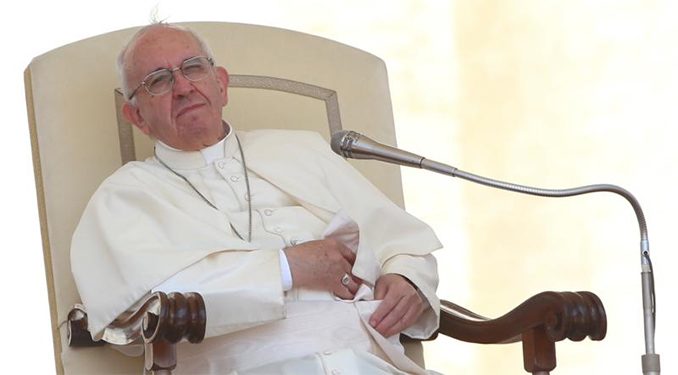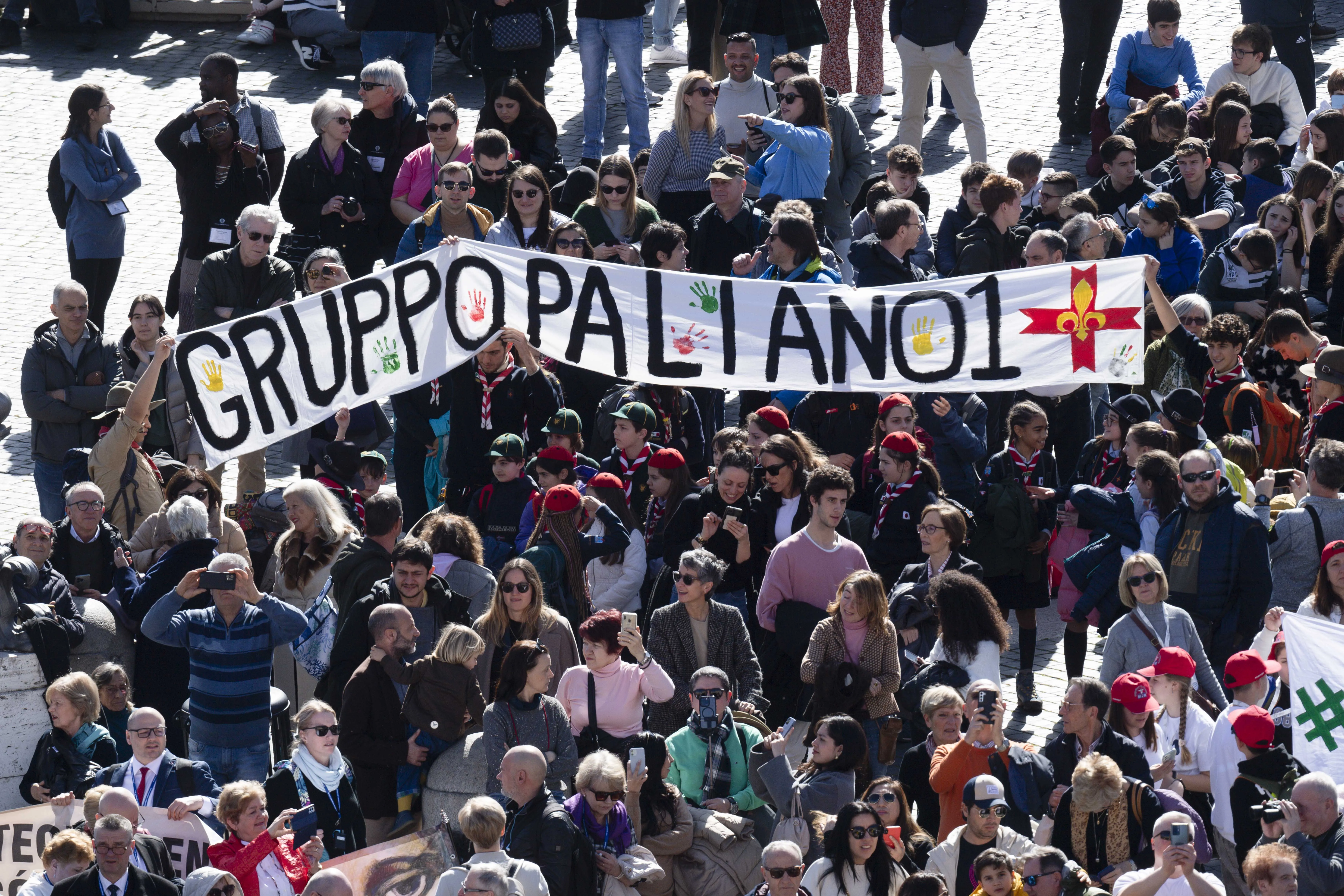
Pope Francis, at yesterday’s General Audience, reportedly (see here and here and here) stated:
Dear brothers and sisters, we are never alone. We can be far, hostile; we can even say we are ‘without God.’ But Jesus Christ’s Gospel reveals to us that God cannot be without us: He will never be a God ‘without man’; it is He who cannot be without us, and this is a great mystery! God cannot be God without man: this is a great mystery!
As is often the case with the Holy Father, precision and clarity wilt and melt a bit in the service of what may or may not be a good point. The most positive way of understanding his statement, it seems to me, is that since God the Son has joined himself to humanity in a most radical and eternal manner in the Incarnation, God will never be “without man”. There is no going back. That is true, and it’s an important point, of course, because of what it indicates about both the Trinitarian nature of God and the Trinitarian missions (cf. CCC, 257-60).
But to flatly state that “God cannot be God without man: this is a great mystery!” is problematic. God has no need for mankind; God had no need to create. Put simply: God lacks nothing. Period. And it’s notable that the very first sentence of the Catechism states: “God, infinitely perfect and blessed in himself, in a plan of sheer goodness freely created man to make him share in his own blessed life” (emphasis added). A later section in the Catechism states: “God is eternal blessedness, undying life, unfading light. God is love: Father, Son and Holy Spirit. God freely wills to communicate the glory of his blessed life” (par 257).
The danger, I think, is that we are tempted to reverse the proper order of how things really are, which is Trinitiarian: all that is, flows from the Trinity and is ordered to the Trinity, which lacks nothing (cf. CCC, 234). When the Catechism states, in the section on prayer, “Whether we realize it or not, prayer is the encounter of God’s thirst with ours. God thirsts that we may thirst for him”, we must recognize that God’s thirst for us is itself a free gift, not a need. Put in a more dramatic way: even if, after the Incarnation, no one accepted Christ as the Savior, God would still be infinitely perfect and blessed in himself—and yet would still thirst for us, for He “desires all men to be saved and to come to the knowledge of the truth” (1 Tim 2:4). Which is why the opening paragraph of Catechism continues:
For this reason, at every time and in every place, God draws close to man. He calls man to seek him, to know him, to love him with all his strength. He calls together all men, scattered and divided by sin, into the unity of his family, the Church. To accomplish this, when the fullness of time had come, God sent his Son as Redeemer and Saviour. In his Son and through him, he invites men to become, in the Holy Spirit, his adopted children and thus heirs of his blessed life.
Notice how every action described here indicates God’s initiative—He draws close, He calls, He sent, He invites—while man always responds. The same important emphasis can be seen in the opening paragraphs of Lumen Gentium. Notice, too, that God’s gift of divine life—what is called deification or theosis—is a matter of Trinitarian love, not cosmic neediness. To suggest, even unwittingly, that God somehow lacked or was incomplete without us would seriously skew and even damage a proper understanding of both who God is and who we are in relation to Him.
If you value the news and views Catholic World Report provides, please consider donating to support our efforts. Your contribution will help us continue to make CWR available to all readers worldwide for free, without a subscription. Thank you for your generosity!
Click here for more information on donating to CWR. Click here to sign up for our newsletter.






Perhaps to be charitable the holy Father was pointing out the Triune God is literally creative and in a community . The revealed Trinity did create us and redeem us . Of course he was free but there was something in his nature that made it appropriate. It wasn’t simply an arbitary choice it was in keeping with the Triune creative nature of God.
For whatever reason, the man continues to mutter, babble and speak in circles. He is very clever, nevertheless.
This is yet another example of PF throwing just a wee bit more gasoline on the fire.
Never take your eyes off him. Untrustworthy. It pains me to say that but it is what it is.
My first take agreed with yours. Initially the Pontiff’s remark could be interpreted in a Trinitarian sense. God so loved the world that he sent his only Son. And the Holy Spirit. What disassembles this is the Pontiff’s emphasis that God needs us. That, however we shake and bake it is fallacy. The Pontiff’s understanding must be interpreted in the larger context of primacy of conscience v Rules premised in AL. And his notion borrowed from Peron that Reality is greater than ideas. Translated later as Reality is greater than the immutable rules of Ideologues. “The God who is enthroned over the world and history as a changeless being is an offense to man. One must deny him for man’s sake, because he claims for himself the dignity and honor that belong to man.” It’s a humanistic world view masked in religiosity in tandem with Card Kasper, Fr Spadaro SJ et Al. It assumes the exact wording long past used by Kasper. “Such a God springs from a rigid world view”. (Walter Kasper in Einführang in de Glauben – An Introduction to the Faith, 1972). Mr Olson you are entirely correct in noting this distinction. The difference again is remarkable. The new world view suggests mercy sans justice recently elaborated by Fr Scalia, and removal of divine justice as eternal retribution for denying God. The Pontiff’s previous stated belief is for the unrepentant sinner existence itself ends. Pope Francis’ new world view, a remake of the Gospels is Apotheosis. Sadly and distressingly it is in tandem with the first of God’s creatures who assumed primacy.
If you were the Sankt Gallen Group and you wanted to have the most impact on the Church for the longest span, you could do worse than trying to delegitimize the institution of the Papacy.
“The danger, I think, is that we are tempted to reverse the proper order of how things really are…” This is the ongoing danger with Francis, who bends truth like a wise Latino judge crossed with a middle-aged youth pastor to serve his folksy homilies. Modern people weened on monthly superhero movies and reality shows and uncomfortable with moral absolutes relate to his rhetoric. People who love and admire the Catholic tradition of precision in theology and exactitude in thought aren’t so appreciative. Count me in the latter group. I am all for parish priests building bridges with Everyman. I’d rather the Pope spend time making sure the eternal bridge stands fast and firm and in the best repair possible. When he chose the name of Francis, I recall some blogger saying that while St. Francis was an amazing saint, he would have made a problematic pope because of the distinct spirituality the name now represents. At th eime I didn’t get the point. Boy do I now…
This is deeply disturbing. Pope Francis seems unduly influenced by some of the worst aspects of 19th century German idealism.
Prayer AND fasting now needed.
Unfortunately this pope (Pope?) is unsound & incompetent intellectually.
He is not intelligent and mangles Scripture everyday. He is also cruel and destroys Traditionalist communities.
I am trying very hard to view this pope as a kindly old uncle, always ready to offer encouragement to his large family, but a little far gone in the head, and who offers bizarre opinions at the dinner table, which no one should heed or be distressed about. However, as you point out, the man’s sheer viciousness with some religious orders make this effort difficult to sustain.
Per Fr. Morello’s comment, here is what I immediately discerned when I first read Kasper’s statement “The God who sits enthroned over the world and history as a changeless being is an offense to man.” (Kasper, God in History 1967)
I immediately sensed that Kasper doesn’t believe God is a real person – God is just a construct of Man’s imagination – nothing more than the sum of what man dictates.
And I do not trust Pope F – because he is a follower of Kasper – and Kasper is simply post-Christian.
Chris your identity of “construct,” or concept of God is paramount. We have a paradigm shift in theology from what is revealed in and by Jesus Christ as belonging to ideology and Rules, whereas reality lies with Man.
Which, I believe, is called “modernism”
Now, aren’t glad they suppressed that nasty oath?
Fatima, you nailed it.
This pope is in way over his head. He has been put where he is for a purpose.
When his handlers are satisfied the dirty work has been accomplished, he will go away.